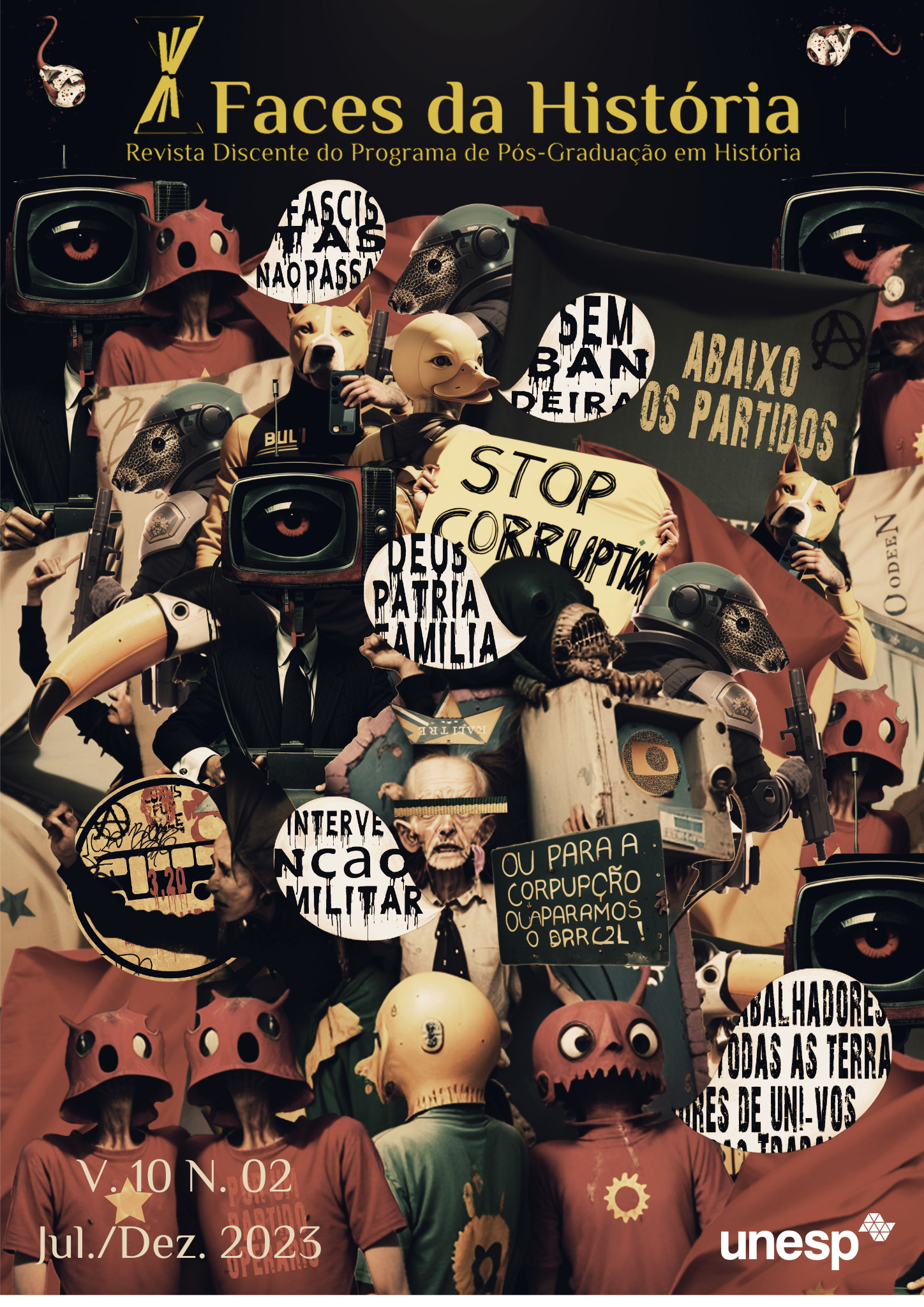Social Outcry and Brazil's 2013 Protest Cycles
conceptual approaches in the light of social movement theories
Keywords:
Movimentos sociais. Participação do cidadão. Política e governo.Abstract
This text aims to problematize some aspects of the concept of protest cycle related to the classical theory of social movements and, to this end, will use as an analytical field the Brazil's 2013 protest cycles, which has just completed ten years. Thus, we propose to raise theoretical reflections linked to the more general aspects of those events marked by social outcry, especially regarding the process of formation of protest cycles. In conclusion, we’ll use an indispensable discussion on the theories of social movements at first, and, then, we address the categories of analysis of structures of political opportunities and repertoire to carry out, some specific, mainly due to the historical landmark of the decade of this event.
References
ALONSO, Angela. As teorias dos movimentos sociais: um balanço do debate. Revista Lua Nova, São Paulo, v.1, n.76, p. 49-86, jul. 2009.
ABERLE, David Friend. The peyote religion among the navaho. 2. ed. University of Oklahoma Press. 1966
BLUMER, Herbert. Group tension and interest organization. Proceedings of the second annual meeting. 1949.
CALIL, Gilberto Grassi Calil. Embates e disputas em torno das jornadas de junho. Revista Projeto História, v. 47, 2014. [ONLINE]. Disponível em: < https://revistas.pucsp.br/index.php/revph/article/view/17155>. Acesso em: 11 nov. 2023.
CASTELLS, Manuel. Redes de indignação e esperança: movimentos sociais na era da internet. Rio de Janeiro. Zahar, 2013.
CORRÊA, Felipe. Movimentos sociais, burocratização e poder popular: da teoria à prática. Passa Palavra [ONLINE]. Disponível em: < https://passapalavra.info/2010/11/32138/>. Acesso em: 01 jul. 2023.
DIREITOS HUMANOS, Comissões: manifestações no Brasil e o direito a cidade. Agência Senado, Brasília, 11 jul. 2013. Disponível em: <http://www12.senado.gov.br/noticias/materias/2013/07/11/manifestacoes-revelam-luta-por-2018direito-a-cidade2019-dizem-jovens>. Acesso em: 27 jun. 2023.
FROMM, Erich. Escape from freedom. New York: Rinehart and Co., 1941. 1, p. 74ss. Edição brasileira: O medo à liberdade. Rio de Janeiro: Zahar Editores, 1981.].
GOFFMAN, Erving. The presentation of self in everyday life. Garden City. New York: Doubleday Anchor, 1959.
GOHN, Maria da Glória. Teoria dos movimentos sociais: paradigmas clássicos e contemporâneos. São Paulo: Edições Loyola, 1997.
GOHN, Maria da Glória. Teoria dos movimentos sociais. São Paulo: Edições Loyola, 1999.
GOHN, Maria da Glória. Movimentos sociais e redes de mobilizações civis no Brasil contemporâneo. Petrópolis: Vozes, 2010.
GOHN, Maria da Glória. A sociedade brasileira em movimento: vozes das ruas e seus ecos políticos e sociais. Rev. Cad. Metrop., São Paulo, v. 27, n. 71, p. 431-441, ago. 2014.
GUSFIELD, Joseph. Social structure and moral reform: a study of the womans christian temperance union. n. 6. p. 221-232. American Journal of Sociology, 1955.
HEBERLE, Rudolf. Social movements: an introducion to political sociology. New York: Appleton-Century-Crofts Inc, 1951.
HOFFER, Eric. The true believer: thoughts on the nature of mass movements. Nova York: Harper and Row. 1951.
JENKINS, Craig. Resource mobilization theory and the study of social movements. Annual Review of Sociology, 9, 527-553, 1983.
KORNHAUSER, William. The politics of mass society. New York: Free Press. 1959.
LIPSET, Seymour Martin. Agrarian socialism. Berkeley: Un. California Press, 1950.
McCARTHY, John; ZALD, Mayer. Comparative perspectives on social movements. p. 141-151. Cambridge: Cambridge Un. Press, 1977.
MCADAM, D.; TARROW, S.; TILLY, C. Para mapear o confronto político. Revista Lua Nova, São Paulo, v.1, n.76, p. 11-48, jul. 2009.
MELUCCI, Alberto. A invenção do presente: movimentos sociais nas sociedades complexas. Petrópolis: Vozes, 2001.
MELUCCI, Alberto. Acción colectiva, vida cotidiana y democracía. México: El Colegio de México; Centro de Estudios Sociológicos; 1999.
SANTOS, Gustavo Sousa. O sujeito, as coisas e a rede nas jornadas de junho. Rev. Cad. Metrop., São Paulo, v. 24, n. 55, pp. 911-935, set./dez. de 2022.
SELZINCK, Philip. The organizational weapons. New York: McGraw-Hill, 1952.
SCHWARZ, Roberto, David; MARICATO, Ermínia; BRITO, Felipe et. al. Cidades rebeldes: passe livre e as manifestações que tomaram as ruas do Brasil. São Paulo: Boitempo, 2013.
SMELSER, Neil. Teoria del comportamiento colectivo. México: FCE, 1962.
TARROW, Power in movement: social movements, collective action and politics. Nova Iorque, Cambridge University Press, 1994.
TARROW, Sidney. O poder em movimento: movimentos sociais e confronto político. Petrópolis: Vozes, 2009.
TILLY, Charles; TARROW, Sidney. Contentions politics. London, Paradigm Publishers, 2007.
TURNER, Ralph.; KILLIAN, Lewis. Collective behavior. New York: Prentice-Hall, 1957.
Published
How to Cite
Issue
Section
License
Autores que publicam na Revista Faces da História concordam com a cessão dos direitos autorais dos manuscritos, processo simultaneamente licenciado sob a Licença Creative Commons Attribution (CC-BY-NC), que permite o compartilhamento do trabalho com reconhecimento da autoria e publicação inicial nesta revista. Dessa forma, a Revista Faces da História pode difundir os artigos e trabalhos publicados, em formatos físicos e/ou eletrônicos, incluindo Internet.




